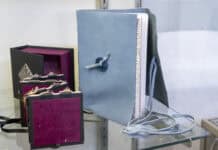Before the coronavirus upended life in Arizona, the Sedona Red Rock News was trying to learn Coconino County Attorney Bill Ring’s policies for obtaining search warrants for drivers’ mobile devices following traffic incidents. Ring is responsible for setting these guidelines for law enforcement agencies within his jurisdiction — including the Sedona Police Department.
Mobile phone searches are potentially significant for enforcing the state’s texting and driving ban, “Hands-free AZ,” passed last year by the state legislature.
Since April of 2019, holding a mobile device and sending or reading messages while operating a motor vehicle have been against Arizona state law. During the signing ceremony for Hands-free AZ, Arizona Gov. Doug Ducey said the aim of new law was to reduce the number of deaths resulting from distracted driving. Ducey’s office cited statistics indicating that states with hands-free bans had a 16% reduction in road fatalities.
Until January of 2021, police may only issue warnings to drivers for violations of the new hands-free law, ARS 28-914. Warning a driver is hardly worth obtaining a search warrant, and even when the law goes into full effect, the penalties for being caught texting and driving are modest — with a max fine of $149 for a first violation and $250 for a second.
But causing death or serious injury while violating the distracted driving ban, ARS 28-672, is currently a criminal offense and carries more significant penalties.
Residents concerned about being the victim of distracted driving — or concerned about their rights following a traffic accident — may want to know the local rules surrounding police searches of phones following traffic accidents.
But Ring’s office would not comment on Coconino County’s policies on phone searches following traffic accidents — or provide a reason for keeping the policy secret.
The request to Ring’s office was precipitated by a vehicle vs. pedestrian fatality that occurred a few blocks north of THE NEWS’ Uptown office on Nov. 15, when a pickup truck hit Sedona resident Dominick Morley from behind while he walked in the northbound lane of Jordan Road.
Morley was thrown 41 feet. Based on that distance, an investigating officer estimated the pickup truck was traveling 24 to 29 miles per hour when it struck Morley. The investigating officer did not find evidence of breaking before the collision.
Morley was flown to the Flagstaff Medical Center, where he died from his injuries five days later.
THE NEWS wanted to know whether investigators of an incident like this could examine a driver’s cell phone to investigate whether distracted driving could have been a factor in the incident.
Lt. Lucas Wilcoxson, Support Services Division supervisor for Sedona Police Department, told THE NEWS in December that Ring’s office had told SPD that officers can only seek warrants for mobile devices following traffic accidents if officers had a witness to device usage prior to the accident, which they did not have in the Jordan Road case.
When THE NEWS tried to confirm Coconino County’s policy on cell phone searches directly with Ring, he did not respond. When the NEWS finally made contact with Ring’s assistant, Amanda Delano, she wrote that Ring was declining to answer the query or explain why.
“Mr. Ring does not wish to have any further discussion on the matter, regardless of whether this is on or off the record,” DeLano wrote. “I must ask that you cease this inquiry,” she wrote in response to a follow-up email.
It’s not clear why Ring’s office is being tight-lipped about its guidelines for law enforcement on cell phone warrants.
The Yavapai County Attorney’s Office responded immediately when asked for the same information earlier this year. Dennis McGrane, chief deputy in the Yavapai County Attorney’s Office, told THE NEWS that the Yavapai County Attorney did not have a specific witness requirement for seeking cell phone search warrants related to distracted driving.
However, “just because there’s an accident, isn’t enough [to search a phone],” McGrane said. “There has to be other information.”
The Yavapai County Attorney doesn’t specifically require that the other information has to be a witness observing a driver on a phone before an accident, as Wilcoxson said of Coconino County.
“Circumstantial evidence is evidence,” McGrane said of distracted driving investigations in general, not commenting on the Uptown incident specifically. “I would tell [police officers] to include that with whatever they have” when seeking a search warrant.
But McGrane also explained that even with a search warrant for a driver’s cell phone, proving a violation of Hands-free AZ is difficult. He pointed out that the law allows drivers to use hands-free functions while driving. So even if an investigator determines a cell app was sending messages at the moment of an accident, investigators would have to prove the phone wasn’t being operated hands free.
“I think you are discovering what we knew to be true,” McGrane said. “[Distracted driving] is tough to prove.”
The difficulty of proving that a driver was touching a mobile device at the time of an accident might be why having a witness to distracted driving is so important to Ring, but without his willingness to talk, it’s not clear if that is the reason.
According to SPD Lt. Stephanie Foley, the Jordan Road collision is still under review at the County Attorney’s office, and a final charging decision has not been made yet.



















